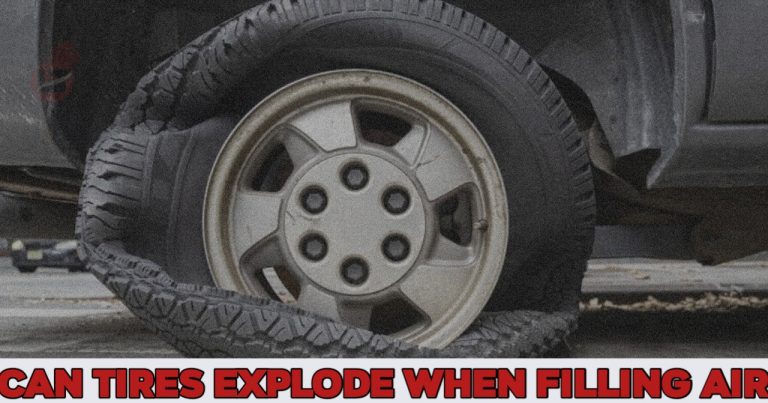For security reasons, the question “Can tires Explode when filling air” has been a significant concern to car users, and this article answers just that.
Tire manufacturers set a particular PSI (pounds per square inch) that tires should be filled with, and it is usually located by the sidewall of the tires or manual.
They also added the Tire Pressure Monitoring System (TPMS) to enable you to deflate and inflate the tires properly.
According to car experts, heavy-duty trucks can be inflated from 60 to 80 PSI, while smaller cars run perfectly on a 30 to 40 PSI-filled tire.
And NO, tires in perfect condition can’t explode when air fills, but over-inflation or bulges on the side could result in an explosion.
Without wasting much time, let’s know why tires will explode while filling the air.
Can Tires Explode when filling air?
No, tires in good condition won’t explode while filling air but overfilling, cracks, and defects in the tire system could cause an explosion.
There have been incidents of tires exploding and killing people, incredibly when filling air into it, but there’s more than meets the eye in those incidents.
Either the victims don’t inspect their tires for cracks or bulges and only perform replacement when it goes flat, or they are filling enough air than required.
As a car owner, you should check your tire’s condition (sidewall, bulges/bubbles, cracks) before pumping air into it.
Also, low-profile tires can explode because they aren’t durable compared to high-quality tires.
The conditions that’ll make a car tire explode when filling with air are:
- Bulges/bubbles on the tire
- Old, weak, or expired tires
- Injured tires
- Cracks or cuts on the tires (sidewall)
- Over or Under Inflation
- Overloading
- Worn or damaged thread
- Low profiled tires
- Manufacturers defects
- Fault from the rim the tires are mounted on
So, to prevent the explosion of tires, inspect your tires regularly and ensure you fill in the recommended air pressure.
To avoid the risk of tire explosion, you can also seek the service of tire experts to help you fill in the air.
How do I keep my tires from exploding?
Here are some tips to keep your tires from exploding;
- Regularly inspect your tires
- Always use high-profiled tires
- Avoid overloading your car tires
- Fill in the recommended air pressure (Avoid over and under-inflation)
- Stay clear of road hazards (sharp objects, potholes)
- Patch your tires if there’s a tear
- Replace your tire at least twice a year.
FAQs
Can a tire explode while filling it with air?
No, it’s practically impossible for your car tire to explode during pumping. The average pressure limit for an explosion is 250 PSI while your car runs on a 30 – 30 PSI, so common knowledge should tell you when you’re over-inflating your tires.
Except for some cases where your car has bubbles, cracks, or has become too weak to hold air pressure.
What causes a tire to explode when filling?
Bulges/bubbles on the tire, old, weak, or expired tires, injured tires, cracks or cuts on the tires (sidewall), over or under Inflation, overloading, worn or damaged thread, low profiled tires, fault from the rim the tires are mounted on, and manufacturer defects can cause tires to explode when filling.
How much pressure can a tire take before it explodes?
A tire can accumulate between 250 – 1,000 PSI before it finally explodes due to over-inflation.
What happens when you fill a tire too much?
When you fill a tire with too much air, your car won’t be able to firmly grip the surface of the road, resulting in a bumpy ride. It will also increase the rate of wear and tear on the tires.
What is the most common cause of tire blowouts?
Tire blowouts are often caused by either the presence of bulges on tires or under-inflated tires. Bulging or tearing on the tires can cause air leaks from the tires, which will, in turn, cause blowouts.
Underinflated tires will also increase the temperature due to their contact with the rims, leading to a temperature rise.
As an Amazon Service LLC Program Associate, V. Auto Basics earns from qualifying purchases. See Our Affiliate disclaimer.
